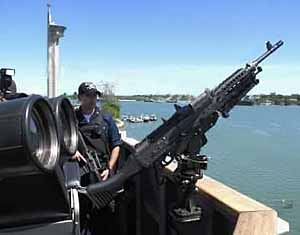09.06.2008
May 31, 2008 (the date of publication in Russian)
Alexei Chichkin
UNDER THE GUISE OF COMBATING PIRATES
The United States and India make the first step towards a "South Asian NATO"
 On May 19, top government officials from nine countries of Asia and Africa – Bangladesh, Comoros, India, Madagascar, the Maldives, Mauritius, Oman, Pakistan, and Sri Lanka, assembled in Male, the capital of the Republic of Maldives, for a four-day international conference. The event, greeted by Maldive President Maumoon Abdul Gayoom, was officially organized by the Transport Ministry of the archipelago. However, the title of the conference Ц "Partnering for a Safer Sea" Ц strangely echoed Partnership for Peace, a NATO framework for would-be neighbors from the former Soviet area of influence.
On May 19, top government officials from nine countries of Asia and Africa – Bangladesh, Comoros, India, Madagascar, the Maldives, Mauritius, Oman, Pakistan, and Sri Lanka, assembled in Male, the capital of the Republic of Maldives, for a four-day international conference. The event, greeted by Maldive President Maumoon Abdul Gayoom, was officially organized by the Transport Ministry of the archipelago. However, the title of the conference Ц "Partnering for a Safer Sea" Ц strangely echoed Partnership for Peace, a NATO framework for would-be neighbors from the former Soviet area of influence.
Curiously, the headquarters of the new organization is going to be established in the United States, the political center remaining in Male. It is similarly indicative that the keynote speech was delivered at the May event not by the local Transport Minister but by a renowned veteran of the US intelligence community Ц Rear Admiral Craig E. Bone from the US Coast Guard. He arrived in Male in order to inaugurate a newly-established international security organization, named South Asia Regional Port Security Cooperative (SARPSCO), and created ostensibly for the purpose of combating illegal fishing and protecting maritime trade from pirates, in order to "prevent disruption of maritime traffic of oil" across the ocean and thus to protect the interests of Asian oil consumers.
At the first glance, creation of an institution of this profile is quite expedient, as mass media report about assaults of pirates on civil ships in the Indian Ocean almost every day. In fact, however, such incidents take place predominantly near the coastline of the war-ridden and pauperized Somali, where Washington, ostensibly for most decent purposes, once sparked a brutal tribal warfare. In the Strait of Maldives, on the contrary, the activities of pirates have lately ebbed away.
However, one more SARPSCO's function is to "prevent organized criminal activities" in the Indian Ocean, ranging from piracy to illegal traffic of weapons and drugs. Bone made clear that the organization of SARPSCO "sends a clear message and a warning to terrorists and criminals in the South Asia and Indian Ocean region that they will be detected, they will be interdicted and their activities will not be tolerated". Under a similar pretext, the United States intervened in Afghanistan in 2002.
In fact, the only guerilla group, operating in the area, is Liberation Tigers of Tamil Eelama (LTTE). Its activities are restricted to the northern part of Sri Lanka and the adjacent districts of India, and focused on claims for independence of their native territory.
Hypothetically, one could also suggest that some plotters are expected to overtake some other small island territory, like the Comoros where Bob Denard overthrew the government of Ali Swalih back in 1970s. A similar assault on the Seychelles was efficiently suppressed twenty years ago.
Therefore, the real purposes of the newly-found organization may be far distant from the official pretext. It is noteworthy that all of its member nations have strong Western ties. The Maldives and Oman pursue military cooperation with the United Kingdom, while the Comoros have strong connections with France. In its turn, India has lately sought closer rapprochement with Washington.
According to Stars and Stripes military newspaper, the initiative of establishing the organization, unifying littoral states of the Indian Ocean, belonged to Lt. Cmdr. Richard Kavanaugh, an international port security liaison officer, serving at the Tokyo office of the Coast Guard Activities Far East. Mr. Kavanaugh had reportedly spent two years making port calls and facilitating the agreement. "His office, with little fanfare, assists with security of US and international shipping interests through the Asia-Pacific region", reports the intelligence website.
Thus, the newly-established alliance of states is going to assist US interests in the region where many countries have lately been strongly opposing US policies. It is noteworthy that the framework of SARPSCO does not include Iran, Saudi Arabia, Malaysia, Indonesia, Myanmar, as well as South Africa, Kenya, Tanzania and Mozambique that also have got ports at the Indian Ocean coastline. Thus, one could fairly interpret the purpose of SARPSCO's foundation as a deliberate effort to create an instrument of espionage and political pressure upon the "problematic" nations of Asia and Africa Ц predominantly those that are about to fall under political and economic influence of China. The new organization is thus likely to develop into a Southern analogue of NATO, built upon the rapidly developing axis of the United States and India.
Number of shows: 1193
 ENG
ENG 

 ENG
ENG 
